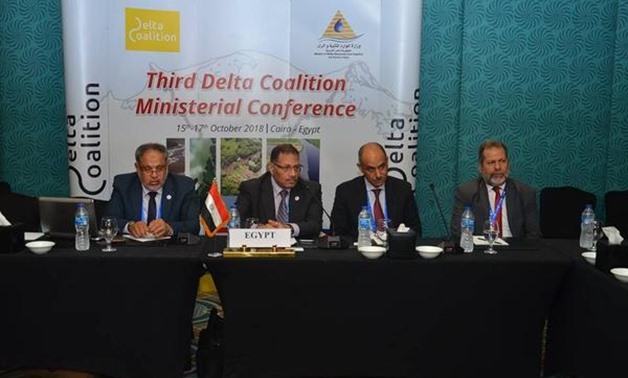
It is expected that the coalition will adopt a declaration on facing climate change threats on Tuesday.
CAIRO – 16 October 2018: During the third Delta Coalition Ministerial Conference held on the sidelines of the Egyptian first Cairo Water Week on Monday, Oct. 15, several countries, including Egypt, presented their experiences on climate change adaptation.
Representatives of the 13 member states exchanged their experiences to find solutions or mitigation strategies to save low-lying areas and coastal cities vulnerable to the effects of climate change like sea level rise.
The Egyptian government adopted coastal cities along the Mediterranean Sea. It inked a $31.5 million grant agreement with the Green Climate Fund and the United Nations Development Programme (UNDP).
The funds will be allocated for an eco-friendly dike system, a sheet of rock formed in a fracture of a pre-existing rock body to create a 69km-long wall in front of the shores of Delta governorates.
During the conference, which was chaired by Egypt, Bangladesh highlighted the most significant challenges it faces such as drought, floods and water shortage. The Dutch delegation also gave a presentation on Netherlands’ efforts to protect its low-lying areas from the sea level rise.
The Japanese delegation highlighted how Tokyo tries to face the sever disasters of cyclones and monsoons.
It is expected that the coalition will adopt a declaration on facing climate change threats on Tuesday, Oct. 16.
The Delta Coalition was officially launched in 2016, aiming at sharing an integrated management of deltas. The member states are Egypt, Argentina, Bangladesh, Colombia, France, Indonesia, Japan, Mozambique, Myanmar, the Netherlands, the Philippines, South Korea and Vietnam.
Egypt's first Cairo Water Week (CWW) kicked off on Oct. 14 under the auspices of President Sisi. It aims to increase public awareness of water rationalization for sustainable development amid a state of water shortage.
The four-day CWW is being held in cooperation with the European Union and the United Nations’ Food and Agricultural Organization (FAO) to tackle water issues, amid climate change that impacts the world’s freshwater.
In March 2016, the United Nations Environment Program warned that 50 percent of the world’s population would face “severe water stress” by 2030.
The 2018 CWW is launched under the title “Water Conservation for Sustainable Development”. It aims at fostering awareness of water issues for sustainable development, facing water challenges via non-traditional methods and modern technology, and supporting the implementation of an integrated water management.


Comments
Leave a Comment